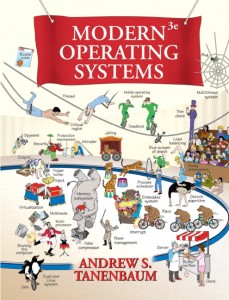Aims and Objectives
This module introduces the basic concepts in operating systems and links it with contemporary operating systems (eg. Unix/Linux and Windows). It focuses on OS structuring and architecture, processes, memory management, concurrency and file systems. Topics include kernel architecture, system calls, interrupts, models of processes, process abstraction and services, scheduling, review of physical memory and memory management hardware, kernel memory management, virtual memory and paging, caches, working set, deadlock, mutual exclusion, synchronization mechanisms, data and metadata in file systems, directories and structure, file system abstraction and operations. Examples will be discussed from contemporary operating systems such as Unix/Linux and/or Windows.
Who, When, and Where
Instructor: Ooi Wei Tsang
Time: Tues, 1200 – 1400
Venue: LT15
Average Weekly Workload
- 2 hours Lecture
- 1 hour Tutorial
- 1 hour Laboratory
- 4 hours Preparatory Work
Assessment Criteria
- 50% Final Exam
- 20% Midterm
- 30% Laboratory
Tentative Schedule
- 12/08: Introduction to CS2106 and Operating Systems
- 19/08: Processes and Threads
- 26/08: Inter-process Communications I
- 02/09: Inter-process Communications II
- 09/09: Scheduling
- 16/09: Deadlock
- 23/09: Recess Week
- 30/09: Memory Management I
- 07/10: Midterm Test
- 14/10: Memory Management II
- 21/10: I/O
- 28/10: Disk Management
- 04/11: File Systems
- 11/11: Review
Textbooks
Note: The cover for international edition might look different.
Required Textbook:

Modern Operating Systems, 3/E
Andrew S. Tanenbaum
ISBN-13: 978-0-136-00663-3
Publisher: Prentice Hall
Published: 2007
Links: NUS Library | Google Books
Optional, Additional Reference:

Operating System Concepts, 8/E
Abraham Silberschatz, Peter B. Galvin, Greg Gagne
ISBN 978-0-470-50949-4
Publisher: Wiley
Publish: 2009
Links (to 6th Edition): NUS Library | Google Books
What is your policy on lateness? I do not think I will be able to get my lab in on time.
Dear Caitlyn,
Without valid reasons, the policy is 0.1 marks for every late minute.
Please email me if you have a strong justification to request for an extension.
regards,
Wei Tsang
This is kind of late but is the first edition of Modern Operating Systems good enough for the course or are there significant differences between it and the later editions?
Yes, there are some differences, especially in the chapter on Linux. Ordering of chapters changed as well. It is best to get borrow an updated copy and compare the differences.
Hi Prof, I saw that there is some changes to the assessment criteria. In the introductory lecture, you mention that the assessment is as of below:
50% final
30% lab
20% mid-term
May I know which one is the finalized assessment criteria? Thank you..